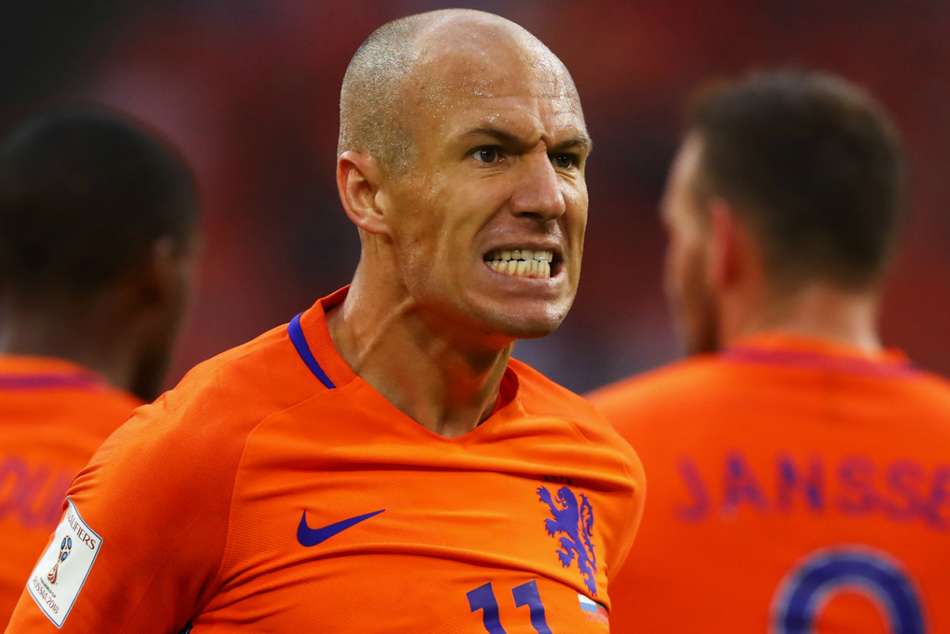
Bengaluru, March 25: Poor competition in Eredivisie, the Dutch domestic league, and bad output of its strikers have turned Netherlands from a powerhouse in football to a bunch of has-beens. It's a tragedy that the Netherlands have never managed to win a World Cup despite reaching the finals on three occasions. But it's a bigger bummer that the Dutch will not feature in this edition of the FIFA World Cup in Russia as they failed to qualify from the UEFA zone.
The first warning shot of the decline of the Oranje football factory came in 2016, when they failed to make the cut for the expanded 24-team European Championship in France. Illustrious stars who perfected the concept of Total Football (Totaal Voetbal) were replaced by average players in the national team. Though this generation of the Dutch national team has players like Kevin Strootman, Virgil Van Dijk, Georginio Wijnaldum and Stefan de Vrij, the forwards have let Netherlands down. The fact that Ryan Babel still plays for Netherlands after having played for some average clubs should tell us the state that the Oranje are in. Memphis Depay has only flattered to deceive and now finds himself at Lyon, while the De Jong brothers (Luke and Siem) have not really lived up to expectations.
Netherlands went from this guy to Wout Weghorst.
— Football__Tweet (@Football__Tweet) March 23, 2018
How the mighty have fallen. ⚽️🇳🇱 pic.twitter.com/Y2JRHHgXPG
One of the main reasons for the decline is a weakened Dutch league. Ajax Amsterdam, PSV Eindhoven and Feyernood barely manage to win a match in qualification stages of the UEFA Champions League. Good Dutch players have all had to leave the Eredivisie to become better footballers. However, with the current crop unable to do well in Netherlands, few of them have managed to go out to better themselves.
This is in stark contrast to the 1970s, the golden era of Dutch football which saw them ply total football and mesmerise the world. Though the total football concept was used earlier by teams like River Plate in the 1940s, Hungary and Burnley (yes, the Premier League team) in the 1950s and Santos in the 1960s, the Dutch used it to perfection in the 1974 World Cup. Johan Cruyff and his manager Rinus Michels, the ambassadors of this style of football, implemented the idea in Ajax and that famous team went on to win three consecutive European Cups (now the Champions League) from 1971 to 1973. Though Rinus Michels left for Barcelona after the first European Cup, he later reunited with Cruyff in 1974 to take them to the final at the World Cup, which they lost to West Germany.
9 - @Memphis was directly involved in 9 of the 13 attempts of the Netherlands v. England (4 shots, 5 created). Pioneer.
— OptaJohan (@OptaJohan) March 23, 2018
Four years later, in-fighting caused many of the top Dutch players like Cruyff, Willem van Hanegem and Jan van Beveren skip the 1978 World Cup. The Dutch managed to reach the final again, but lost to the hosts Argentina.
The 1980s saw the Oranje football factory produce greats like Marco Van Basten, Ronald Koeman, Frank Rijkaard and Ruud Gullit. This team, with Rinus Michels, managed to win the Euro 88, which sadly is the only piece of silverware the Dutch have ever won.
The 90s saw the birth of a golden generation with Dennis Bergkamp, Frank and Ronald De Boer, Marc Overmars and Edwin van der Sar. The 1998 World Cup saw the arrival of Jaap Stam, Patrick Kluivert, Clarence Seedorf, Edgar Davids, Giovanni van Bronkhorst, Mark von Bommel and Jimmy Floyd Hasselbaink.
The 2000s once again showed us how blessed the Dutch were with Dirk Kuyt, Ruud van Nistelrooy, Rafael van der Vaart, Arjen Robben, Robin van Persie, Wesley Sneijder, Nigel de Jong and Klaas-Jan Huntelaar. They famously reached the World Cup in 2010 (losing to Spain) and came third with the same ageing squad in the 2014 World Cup.
Ruud Krol was born #OnThisDay in 1949. One of the world’s greatest ever defenders, he was one of the key players in the great #Ajax & #Netherlands teams of the 70s. pic.twitter.com/oRwtanSH96
— Culture of Football Classics (@CFclassics) March 24, 2018
But that signalled the end of the famous Oranje talent factory.
The current manager, Ronald Koeman, has a job on his hands. He has deemed the players who came after the ageing Robben, van Persie and Sneijder generation as the lost generation. There are talented youngsters like Justin Kluivert and Matthijs de Ligt and they can join hands with the likes of Wijnaldum, de Vrij and van Dijk to form a spine. The painful lack of options in other areas still hurts them.
When asked by a journalist if Netherlands have to now try and perfect the Iceland model (small group of moderately talented players working as a team to win), Koeman begrudgingly accepted that it might be the answer. Whatever said and done, Netherlands have to qualify for Euro 2020 and if that doesn't happen, it is time that the Royal Dutch Football Federation (KNVB) wake up and figure out a different system. After all, not qualifying for three consecutive tournaments will be a historical ebb for Dutch Voetbal. Let's hope that doesn't happen.


 Click it and Unblock the Notifications
Click it and Unblock the Notifications

























